12 Healthiest Butter Substitute Brands, According to Dietitians
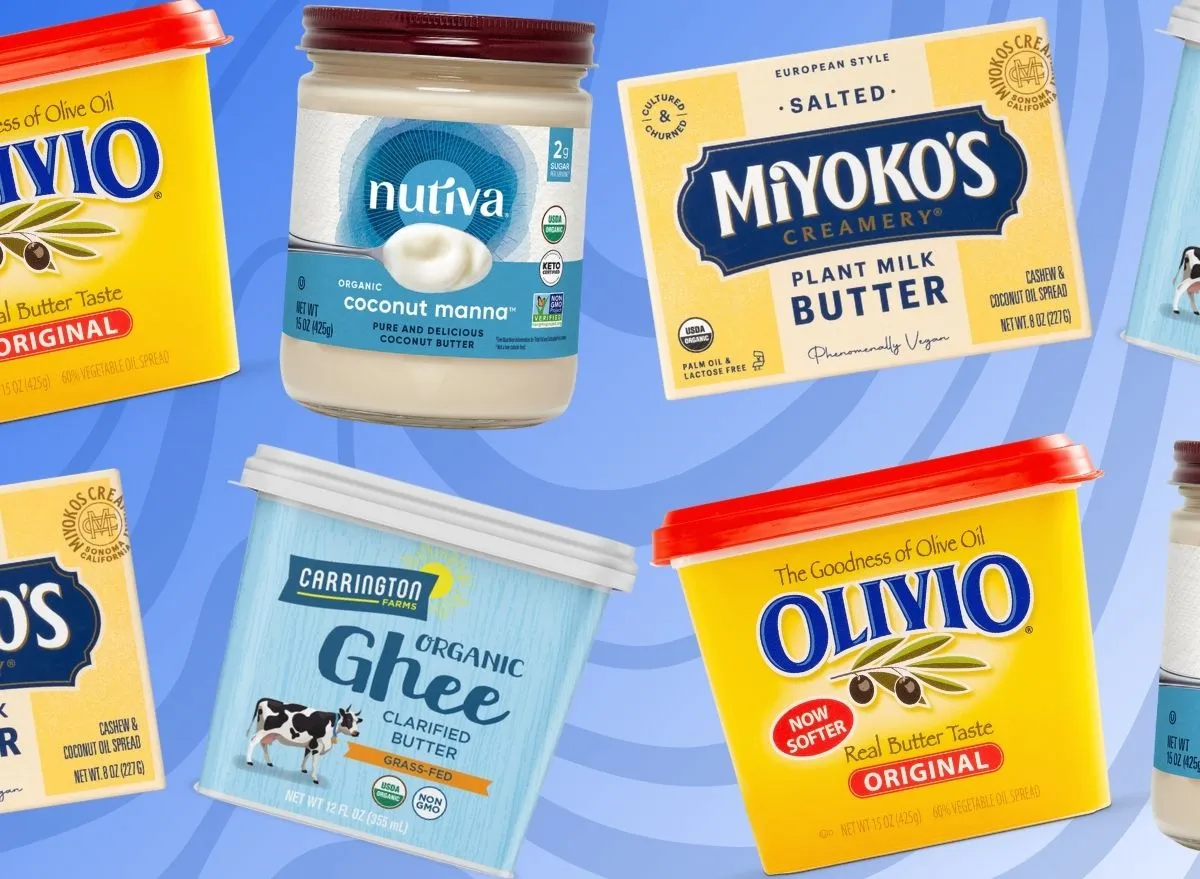
If you’re reading this, you might be aiming to trim some extra calories from your diet with a low-fat butter or seeking a plant-based substitute due to lactose or dairy constraints. However, finding a healthy butter substitute that’s better for you than traditional dairy butter is easier said than done.
Why? For starters, it’s a pretty big market, with a lot of butter substitute brands to choose from. There are low-fat butters made from olive or canola oil, butter sprays promising flavor without the calories, and margarine brands, plant butter, and low-calorie options made with ingredients like buttermilk and yogurt.
But are any of these actually good for you—and, more importantly, are they worth buying? With so many different diet butters on the market, it can be difficult to find nutritious choices, so we asked leading dietitian nutritionists for their takes and their recommendations for the best butter alternative brands.
Why would you want to buy a healthy butter substitute over regular butter?
Butter substitutes are designed to mimic the taste, texture, and functionality of traditional dairy butter but are made from non-dairy or lactose-free ingredients. For example, I Can’t Believe It’s Not Butter is made primarily from water, vegetable oils (such as soybean and palm oil), and various emulsifiers and flavorings.
“Diet butter may be a good choice if you’re trying to cut back on saturated fats, trans fats, or partially hydrogenated oils,” says Amy Gorin, MS, RDN, a plant-forward registered dietitian nutritionist in the New York City area. Most plant-based butters have removed or greatly reduced these ingredients in their products, resulting in a low-calorie, low-fat option.
“Substitute butters can also work better for certain dietary plans since they can be dairy-free and even vegan, which work for those with allergies and those looking to cut out all animal products,” says New Jersey-based dietitian Erin Palinski-Wade, RD, CDE, author of Belly Fat Diet For Dummies.
However, some of these products may veer toward the “less healthy” end of the spectrum due to their ingredients. According to Mary Sabat MS, RDN, LD, “Many margarines and spreads contain harmful oils and inflammatory fats, with ingredients such as hydrogenated oils, palm oil, and trans fats, which can contribute to various health issues like heart disease, inflammation, and compromised cholesterol levels.”
Even though some butter substitutes on the market may not be ideal for your health, many are safe and nutritious.
What are the benefits of switching to a butter substitute?
“Transitioning to a more plant-based diet and opting for a ‘butter’ spread made from unsaturated, plant-based fats can be a great way to help improve cholesterol levels, promote heart health, and reduce inflammation,” says Palinski-Wade.
And before you turn up your nose at butter substitutes because of their bad rap, consider this: your classic trans-fat-laden margarine brands are a thing of the past. Now, healthy butter substitutes eschew partially hydrogenated oils for healthy fats. That’s a really good thing because a 2015 review of studies found that trans fats were associated with an increase in coronary heart disease (CHD) and the number of deaths caused by CHD.
How to shop for a healthy butter substitute
Dietitians share their guidelines for selecting the healthiest butter substitute (that won’t turn out to be worse for you than actual butter):
- Avoid trans fats: “Diet butter containing trans fats can be more detrimental to health [than traditional butter]. That’s because just one to two grams of trans fats per day can have a negative impact on blood lipids,” says Palinski-Wade, who adds that one to two grams are much more than what you would normally get from the saturated fat found in a standard butter spread.
- Compare with dairy butter: Gorin says when she chooses a diet spread or spray, she makes sure a one-tablespoon-sized serving contains less fat and calories than traditional dairy butter (otherwise, there’s not a lot of benefit to opting for an alternative). She recommends aiming for less than 100 calories and seven grams of saturated fat per serving.
- Look for minimal ingredients: “I like for a plant butter to have an ingredient list made up mostly of whole-food ingredients—so no artificial preservatives or additives,” says Gorin. “For example, I Can’t Believe It’s Not Butter! uses vinegar as a natural preservative.”
- Look for healthy fats: Sabat recommends opting for substitute butter that contains healthier fats like coconut oil or olive oil if you can.
In this list:
- Miyoko’s Plant Milk Butter
- Livlo Organic Vegan Ghee
- Kite Hill Plant-Based Butter
- Earth Balance Olive Oil Buttery Spread
- Nutiva Coconut Manna
- Carrington Farms Organic Ghee
- I Can’t Believe It’s Not Butter!
- Olivio Ultimate Spread
- Country Crock Plant Butter with Olive Oil
- WayFare Salted Whipped Butter
- Benecol Buttery Spread
- Smart Balance Buttery Spread
Read on to learn about why dietitians say these are the best butter substitutes to buy, and next, check out the 9 Healthiest Non-Dairy Creamers on Grocery Shelves.
Miyoko’s Plant Milk Butter
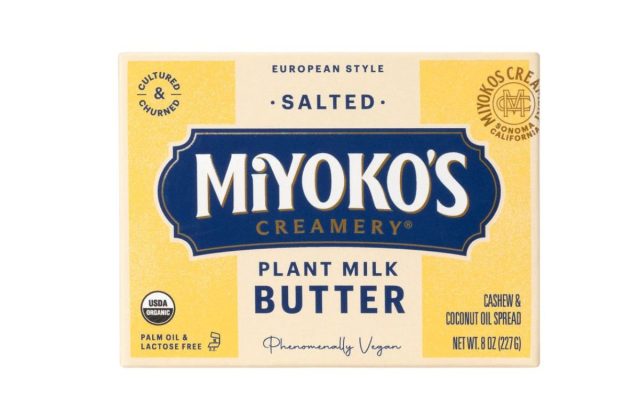
Calories: 90
Fat: 10 g (Saturated Fat: 8 g)
Sodium: 65 mg
Carbs: 0 g (Fiber: 0 g, Sugar: 0 g)
Protein: 0 g
According to Sabat, this plant-based butter from Miyoko’s “is a healthy alternative to traditional butter, featuring organic coconut oil and cultured cashew milk for beneficial fats and nutrients.” She adds, “It’s free from harmful additives like hydrogenated oils, and it supports heart health and metabolism with its rich content of medium-chain triglycerides (MCTs).”
Miyoko’s products are cultured. “Culturing the butter involves the fermentation of cashew milk with live cultures, which enhances its flavor and texture while also promoting the growth of beneficial bacteria. This process not only adds a tangy taste reminiscent of traditional cultured butter but also potentially increases its nutritional value by improving digestibility and promoting gut health,” says Sabat.
Livlo Organic Vegan Ghee
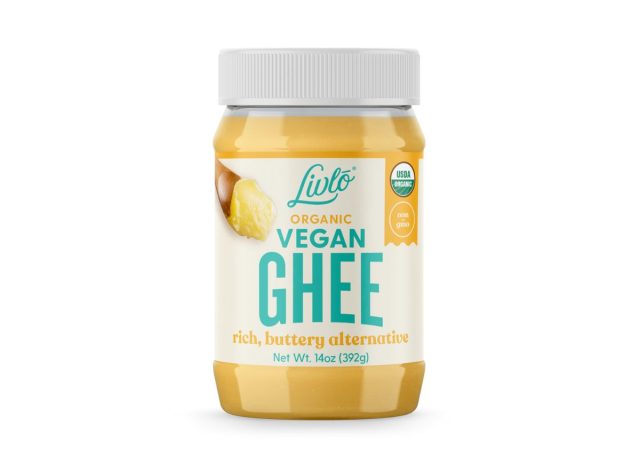
Calories: 130
Fat: 14 g (Saturated Fat: 11 g)
Sodium: 0 mg
Carbs: 0 g (Fiber: 0 g, Sugar: 0 g)
Protein: 0 g
“Livlo Vegan Ghee presents an excellent alternative to traditional butter, particularly for those adhering to a vegan lifestyle or seeking healthier options,” says Sabat. “Crafted from a blend of coconut oil, avocado oil, and natural flavors, it mimics the rich, buttery taste and versatility of traditional ghee without any animal products.”
Aside from the fact that it has a similar texture and flavor profile as regular ghee, Sabat adds that another benefit of Livlo is that “it also boasts organic and non-GMO ingredients, ensuring a high standard of quality.”
Kite Hill Plant-Based Butter
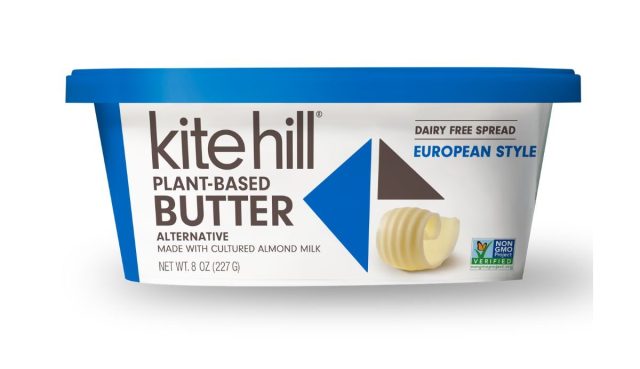
Calories: 90
Fat: 10 g (Saturated Fat: 4 g)
Sodium: 60 mg
Carbs: 0 g (Fiber: 0 g, Sugar: 0 g)
Protein: 0 g
Kite Hill makes a variety of plant-based alternative products with high-quality, trustworthy ingredients. Their Plant-Based Butter is no exception, made with coconut oil, cultured almond milk, and cocoa butter. It also uses beta-carotene for coloring, a naturally occurring plant pigment full of antioxidants.
Earth Balance Olive Oil Buttery Spread
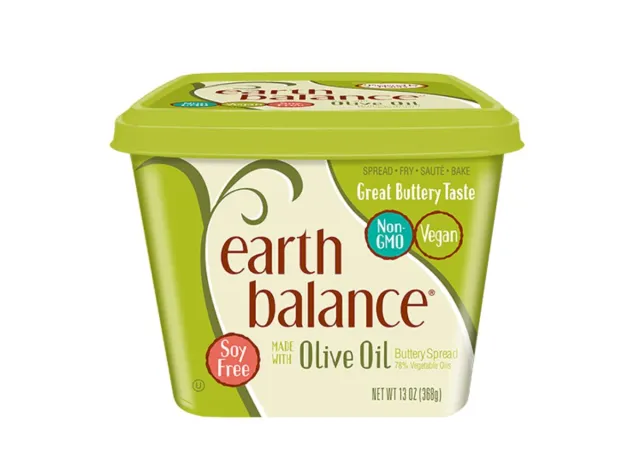
Calories: 80
Fat: 9 g (Saturated Fat: 2.5 g)
Sodium: 75 mg
Carbs: 0 g (Fiber: 0 g, Sugar: 0 g)
Protein: 0 g
This Olive Oil Buttery Spread from Earth Balance is a healthy choice for those looking for a delicious vegan butter alternative. It contains zero trans fats and is high in omega-3 fatty acids. It’s also lactose-free, soy-free, and non-GMO, so it fits a variety of dietary needs.
Nutiva Coconut Manna
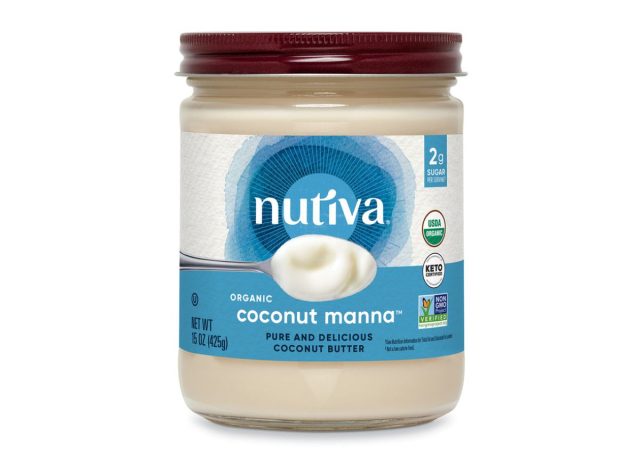
Calories: 200
Fat: 18 g (Saturated Fat: 17 g)
Sodium: 0 mg
Carbs: 7 g (Fiber: 5 g, Sugar: 2 g)
Protein: 2 g
Nutiva makes this spread with pureed coconut and nothing else. That’s right, it has just one ingredient!
“This plant-based spread is sodium- and cholesterol-free, which makes it a great replacement for butter and cream cheese,” says Palinski-Wade.
Carrington Farms Organic Ghee
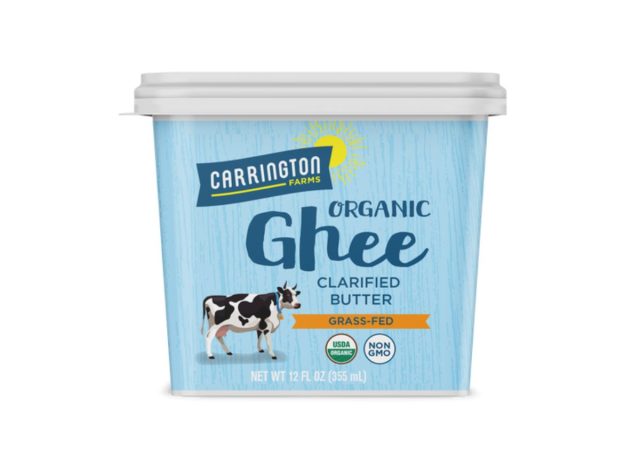
Calories: 130
Fat: 14 g (Saturated Fat: 10 g)
Sodium: 0 mg
Carbs: 0 g (Fiber: 0 g, Sugar: 0 g)
Protein: 0 g
For a healthy ghee, try this organic option from Carrington Farms.
But what exactly is ghee? It’s butter that is run through a clarification process to eliminate all the water (to create a higher smoke point while cooking). The process also eliminates many of the proteins found in dairy, like casein. Palinski-Wade says this makes ghee an alternative butter spread that’s easier for people with lactose sensitivity to tolerate. It’s also especially good for your GI tract.
“Ghee contains a fatty acid known as butyrate acid, which may help to reduce inflammation and support digestive health,” she says.
I Can’t Believe It’s Not Butter!
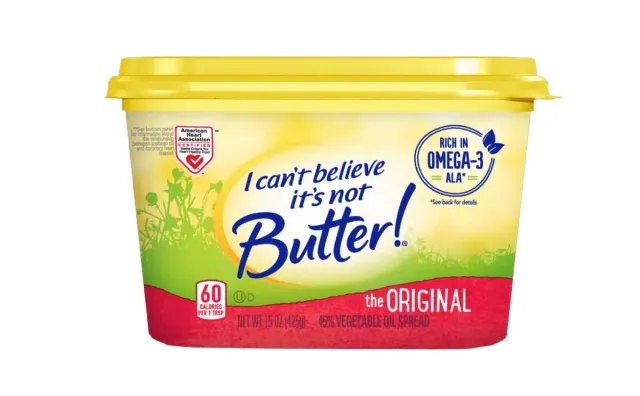
Calories: 60
Fat: 6 g (Saturated Fat: 2 g)
Sodium: 90 mg
Carbs: 0 g (Fiber: 0 g, Sugar: 0 g)
Protein: 0 g
This brand is probably most synonymous with substitute butter, and Gorin says it’s a perfect plant-based spread for many reasons. For one, it’s American Heart Association Heart Check certified. It also has 70% less saturated fat and 40% fewer calories than dairy butter.
It may even be better for the environment than dairy butter: “All of the palm oil it contains is sustainable,” says Gorin, “and its production creates 70% less carbon emissions than dairy butter.”
Olivio Ultimate Spread
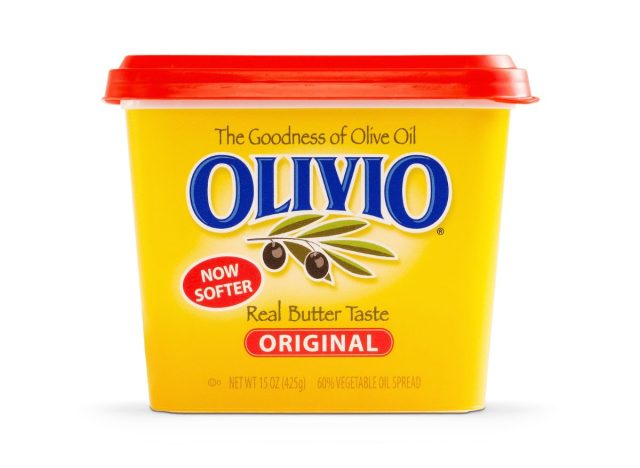
Calories: 80
Fat: 8 g (Saturated Fat: 1.5 g)
Sodium: 95 mg
Carbs: 0 g (Fiber: 0 g, Sugar: 0 g)
Protein: 0 g
Many of the Olivio alternative spreads are suitable replacements for dairy butter, but the Ultimate Spread really shines. The olive oil-based spread is vegan and non-GMO; plus, it contains no preservatives and a boost of ALA omega-3s, a type of fatty acid found in plants that may contribute to heart health.
Country Crock Plant Butter with Olive Oil
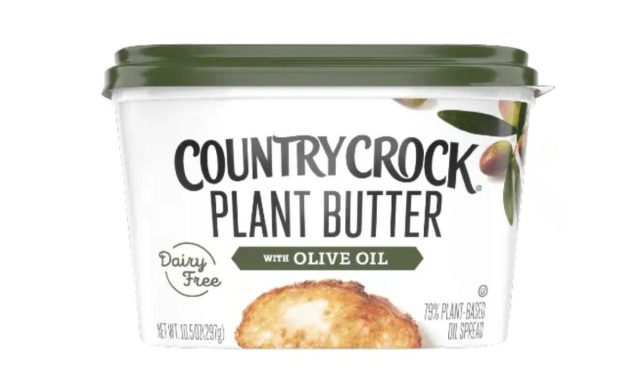
Calories: 100
Fat: 11 g (Saturated Fat: 4 g)
Sodium: 105 mg
Carbs: 0 g (Fiber: 0 g, Sugar: 0 g)
Protein: 0 g
Palinski-Wade suggests using this plant-based spread made from olive oil as a substitute for butter spreads and any butter you need in cooking or baking, as it has less saturated fat than butter. According to Country Crock, production of their plant butter produces less than half the greenhouse gas emissions of dairy butter production.
WayFare Salted Whipped Butter
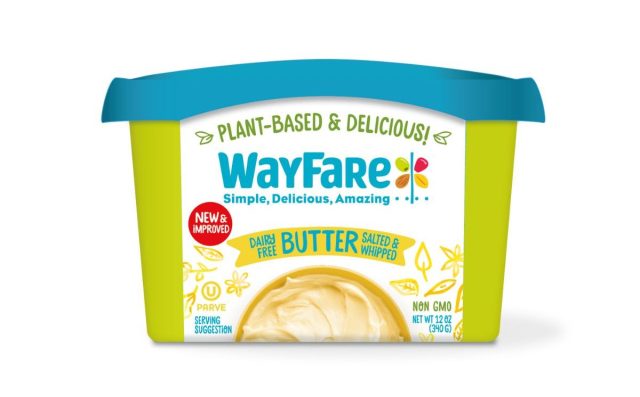
Calories: 60
Fat: 7 g (Saturated Fat: 5 g)
Sodium: 60 mg
Carbs: 0 g (Fiber: 0 g, Sugar: 0 g)
Protein: 0 g
You might raise your eyebrows at the inclusion of pureed lima beans in this vegan, gluten-free, soy-free, plant-based butter, but Palinski-Wade says the legumes lend a creamy consistency to this spread while keeping overall fat and calories low. This plant-based butter alternative incorporates blended lima beans for a creamy consistency with fewer overall calories and fat.
Benecol Buttery Spread
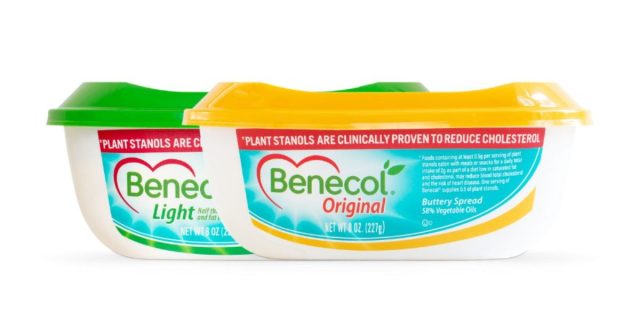
Calories: 70
Fat: 8 g (Saturated Fat: 1 g)
Sodium: 105 mg
Carbs: 0 g (Fiber: 0 g, Sugar: 0 g)
Protein: 0 g
Looking for a healthy butter substitute that really boosts your nutrition profile? Lainey Younkin, MS, RD, dietitian at Lainey Younkin Nutrition, recommends Benecol, which includes plant stanols—a compound she says is proven to reduce total and LDL cholesterol, but are difficult to come by in a normal diet.
“While plant stanols occur naturally in foods, you’d have to eat 12 pounds of broccoli, 29 pounds of carrots, or 60 pounds of tomatoes every day to get the recommended two grams per day for cholesterol reduction,” Younkin says.
Or you could eat Benecol, since four tablespoons contain the recommended two grams of plant stanols. Use it just like you would regular butter, Younkin adds, because it’s a one-to-one swap.
Smart Balance Buttery Spread
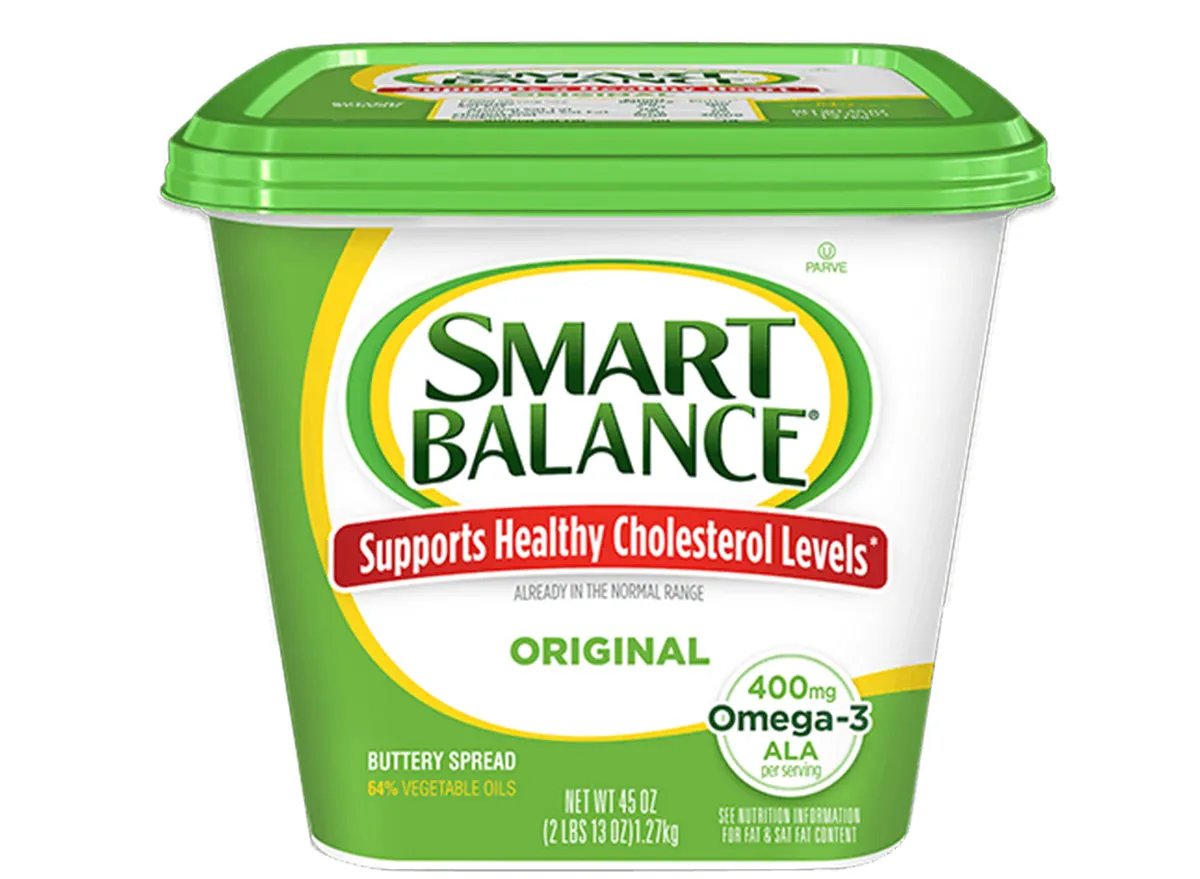
Calories: 80
Fat: 9 g (Saturated Fat: 2.5 g)
Sodium: 90 mg
Carbs: 0 g (Fiber: 0 g, Sugar: 0 g)
Protein: 0 g
This spread is free of dairy, gluten, partially hydrogenated oils, and trans fats. But don’t think you’re buying a nutritionally empty tub. Smart Balance lands a final spot as a healthy butter substitute because the brand loaded its spread with heart-healthy oils, omega-3s, and vitamins, so it tastes yummy and is good for you, too.
- Source: de Souza, R. J., Mente, A., Maroleanu, A., Cozma, A. I., Ha, V., Kishibe, T., Uleryk, E., Budylowski, P., Schünemann, H., Beyene, J., & Anand, S. S. (2015). Intake of saturated and trans unsaturated fatty acids and risk of all cause mortality, cardiovascular disease, and type 2 diabetes: systematic review and meta-analysis of observational studies. BMJ (Clinical research ed.), 351, h3978. https://doi.org/10.1136/bmj.h3978
- Source: Pituch A, Walkowiak J, Banaszkiewicz A. Butyric acid in functional constipation. Prz Gastroenterol. 2013;8(5):295-8. doi: 10.5114/pg.2013.38731. Epub 2013 Oct 28. PMID: 24868272; PMCID: PMC4027827.
- Source: Professional, C. C. M. (n.d.-c). Omega-3 fatty acids. Cleveland Clinic. https://my.clevelandclinic.org/health/articles/17290-omega-3-fatty-acids
- Source: Professional, C. C. M. (n.d.-d). Phytosterols. Cleveland Clinic. https://my.clevelandclinic.org/health/drugs/17368-phytosterols-sterols--stanols









